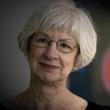Soprano Whitney Morrison was definitely not a late bloomer in her musical career. Nor was she ever inclined to hide her light under the proverbial bushel.’
“My parents tell the story that I could sing before I could talk,” said Morrison, featured in two works by Mead Composer-in-Residence Jessie Montgomery on the CSO MusicNOW concert Nov. 1, with a laugh. “They found me in my crib one day, singing a version of ‘Blessed Be the Rock,’ a song they sang at church. They were doubly astonished when they asked me to sing it for other people. My mom would put me on the counter at the bathroom at church or at dinner, and I would sing. That was the start of my career.”
Though her professional career is still young, Morrison, who was born and currently lives on Chicago’s South Side, has compiled an impressive track record. A master’s degree graduate of the Eastman School of Music, she is also an alumna of Lyric Opera of Chicago’s Ryan Opera Center. Local operagoers may remember her as the brisk yet emphatic Sister Rose in Lyric’s 2019 production of Jake Heggie’s Dead Man Walking. She won critical raves last year in Chicago Opera Theater’s world premiere of Freedom Ride, by Dan Shore. She covered a role in the Metropolitan Opera’s current production of Terence Blanchard’s Fire Shut Up in My Bones and will do the same when Lyric presents the opera this spring. In May, Morrison appears in Michigan Opera Theatre’s production of Anthony Davis’ X: The Life and Times of Malcolm X.
Opera wasn’t high on Morrison’s radar during her student days at Rich South High School in south suburban Richton Park. “My father was very eclectic in his musical taste,” she said. “He would listen to opera and classical music on the radio. But as far as the music I knew really well, it was more the dusties, R&B-kind of music. And a lot of gospel, for sure.”
Morrison wanted to develop her voice, however, so when Lana Manson, the high school’s director of choral music, announced that she would be giving voice lessons, Morrison signed on.
“For a small school performance,” Morrison recalled with a chuckle, “I would ask her, ‘Do I sing this regular or do I sing this high?’ She would say, ‘You’re going to sing this high.’
“I was singing in the concert choir and the gospel choir. I didn’t know what she would be teaching, but I just wanted voice lessons. [Opera] was what I was learning. It was the only technique I really knew. And it turned out that I actually had a real facility and gift for it. I received that training outside of school, on her own time and her own dime. For that, I will always be indebted.”
Morrison relishes the discipline and demands that singing opera requires.
“I like how deeply integrated the practice is. I felt that it was the ultimate liberal arts discipline — the level of kinesthetic intelligence, and math and science that go into preparing to be an opera singer, the sociology and theory. There’s so much. It takes so much from the world at large. It’s a sort of vast and all-encompassing kind of discipline. For me, it’s the challenge and integration of all that.”
Given opera’s centuries-old repertoire, working with contemporary composers like Montgomery is a distinct change of pace for most young opera singers.
“Oftentimes, what we learned to sing in school is music by people who are not alive and whose concepts we can only really understand through reading,” said Morrison. “It’s exhilarating to work with a living composer. It’s enjoyable and somewhat surreal.”
She was based in New York while learning Loisaida, My Love and Lunar Songs, the two Montgomery pieces she will perform Nov. 1. Composed in 2016 and set to a 1974 poem by Puerto Rican poet and activist Bimbo Rivas, Loisaida is a love letter to New York’s Lower East Side. “I was able to be in New York and see the Lower East Side in a contemporary way,” Morrison said. “It was a primary source like I’ve never used before.”
Composed in 2019, Lunar Songs is a short, three-part cycle. Morrison feels a special connection with the cycle’s second song. “It really encapsulates that kind of Afro-Latina heritage that I’m so enthralled with in my own personal life. I’m a big fan of [Cuban-American singer] Celia Cruz and the old-school Fania [label] recordings. So, all the 7/8 and 5/8 rhythms remind me of the salsa dancing and music that I love.”
Morrison believes operas that confront current social issues, like Dead Man Walking and Fire Shut Up in My Bones, attract new audiences. “People have always been curious about opera,” she said, “but they haven’t necessarily felt invited and engaged by it. The idea that opera and classical music are somehow over the heads of the general population, I’m beginning to believe that less and less. This is not just about European, aristocratic people. It is really an art form for the people and for revolution, which a lot of people are very interested in these days.
“And the taste of the general public is primed for classical music because they consume a great deal of it without knowing it. With film scores especially, they’re used to an orchestral sound that brings about drama. So I think contemporary opera gives people a way into the classical music that they would enjoy.”
Morrison recalls a quote from Audley-Chambers, chair of the music department when she attended Oakwood University in Huntsville, Alabama.
“People know what they like, but they also like what they know.”


